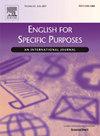Authorial identity construction through implicit stance-taking in the introduction of research articles
IF 2.7
1区 文学
Q1 LINGUISTICS
引用次数: 0
Abstract
Stance is an important resource for the construction of authorial identity. However, much attention has been paid to explicit self-mentions (e.g., I/we), and very little is known about how authorial identities are constructed through implicit stance resources across disciplines. Drawing upon an adapted stance model from Hyland (2005a), this research explores authorial identities constructed through implicit stance resources in 120 introductions of research articles from both soft (i.e., philosophy and linguistics) and hard (i.e., bioscience and materials science) disciplines by using mixed methods. Findings show that: (1) In the construction of opinion holders, with the exception of linguistics, all disciplines tend to employ certainty-indicating boosters rather than fact-asserting boosters to express their opinions; authors of soft disciplines tend to employ commitment hedges, while authors of hard disciplines tend to employ accuracy-oriented hedges. (2) In the construction of evaluators, all disciplines predominantly employ assessment markers and rarely use emotional markers; authors of linguistics use less significance markers than those of hard disciplines to highlight the research value. These nuanced findings are beneficial for teaching students to construct discipline-recognized authorial identities in academic writing.
研究文章导论中隐含立场的作者身份建构
立场是建构作者身份的重要资源。然而,人们对明确的自我提及(例如,我/我们)关注甚多,而对作者身份如何通过跨学科的隐式立场资源构建知之甚少。本研究借鉴Hyland(2005)的立场模型,采用混合方法,对120篇软学科(即哲学和语言学)和硬学科(即生物科学和材料科学)研究文章的介绍中,通过隐含立场资源构建的作者身份进行了探索。结果表明:(1)在意见持有人的构建中,除语言学外,所有学科都倾向于使用确定性指示助推器而不是事实断言助推器来表达意见;软学科的作者倾向于使用承诺模糊限制语,而硬学科的作者倾向于使用以准确性为导向的模糊限制语。(2)在评价者的构建中,各学科均以评价标记为主,情感标记较少;语言学作者比硬学科作者使用更少的显著性标记来突出研究价值。这些细微的发现有助于教授学生在学术写作中构建学科认可的作者身份。
本文章由计算机程序翻译,如有差异,请以英文原文为准。
求助全文
约1分钟内获得全文
求助全文
来源期刊

English for Specific Purposes
LINGUISTICS-
CiteScore
5.70
自引率
8.00%
发文量
41
审稿时长
62 days
期刊介绍:
English For Specific Purposes is an international peer-reviewed journal that welcomes submissions from across the world. Authors are encouraged to submit articles and research/discussion notes on topics relevant to the teaching and learning of discourse for specific communities: academic, occupational, or otherwise specialized. Topics such as the following may be treated from the perspective of English for specific purposes: second language acquisition in specialized contexts, needs assessment, curriculum development and evaluation, materials preparation, discourse analysis, descriptions of specialized varieties of English.
 求助内容:
求助内容: 应助结果提醒方式:
应助结果提醒方式:


